The big, tough, storied football player stood alone in a darkened corner of the conference room, silently tearing up.
As I prepared to play a video for the assembled medical conference attendees, Matt Dunigan had approached me, whispering that he would briefly leave the room during the screening. He would nearby and he promised to reappear as soon as the video was over.
The video encapsulated some highlights – no, actually some of the worst moments – in Dunigan’s otherwise stellar career in the Canadian Football League. A true champion in his day, he suffered as many as twelve serious head injuries and concussions – a result of the hard hits, jarring tackles, and seemingly normal flow of professional football.
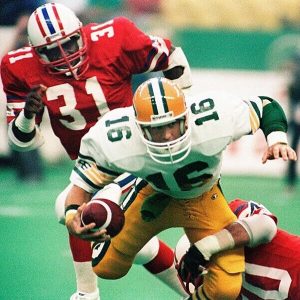
CFL quarterback Matt Dunigan played for Edmonton (as pictured), B.C., Toronto and Winnipeg during his career. Now a popular sports broadcaster, he regularly speaks about concussions and head injuries.
Every year, thousands of Canadians of all ages are diagnosed with a concussion, not just pro athletes. Concussion is the most common form of brain injury: two years ago, more than 100,000 Canadians were diagnosed with a concussion by hospital emergency department staff.
Some 35,000 were children and youth aged five to 19, and more than 65,000 were adults over 20; all were severely impacted. Sports injury was a common cause, but so too simple falls at home or at work. Either way, concussions can have serious short- and long-term effects on brain health.
Matt Dunigan retired in 1996, but he continues to struggle with the impacts of sports-related concussion. He dedicates himself (in addition to keeping up his TSN TV commentator duties) to bringing awareness, prevention, and treatment to all those who suffer from brain injuries and concussions, whether sports-related or not.
He regularly speaks at medical, sports, and concussion conferences, such as the one hosted by the University Health Network (UHN) in Toronto, during which I saw the big man reduced to tears by the painful memories his award-winning career still brings forward. Composing himself quickly after the video, he spoke movingly about the lifelong impacts of traumatic brain injury on patients, on their families, as well as the caregivers and health care professionals involved.
Dunigan has pledged that upon his death, his brain will be donated to the Krembil Neuroscience Centre, a dedicated brain injury facility at UHN where he shared his story, and where cutting-edge research into brain injury, head trauma, and emerging neurological treatments are conducted.
It’s at advanced medical facilities like Krembil where new digital technologies are also being developed to better measure and monitor outcomes for brain injury and concussion patients.
Machine learning and artificial intelligence (AI) algorithms, cloud-based mobile applications, and science-based systems management approaches are bringing forward what’s called “an emerging era in digital sports technology” and much better ways to monitor important human metrics and biomarkers, both on- and off-the-field, as a way to treat post-concussion maladies.
Digital applications used to monitor concussion symptoms and speed recoveries make use of embedded patient monitoring and symptom reporting tools that remotely and automatically keep track of a person’s daily activities (like reaction times, memory and recall, visual information processing capabilities and more) in both rehab and real-world settings.
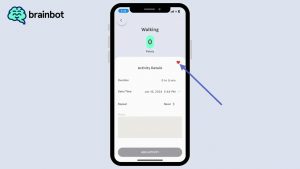
Brainbot, a health technology start-up based in Toronto, is developing a concussion protocol app.
Now, what’s called “the world’s first AI-powered concussion recovery assistant” is being developed in Canada, with input from top clinicians, therapists and concussion sufferers themselves.
Brainbot is a health technology start-up based in Toronto, and it’s the only Canadian company selected by a major U.S.-based pre-seed investor and technology incubator known as the Techstars Healthcare Accelerator.
The Canadian start-up has been part of Techstars’ three-month program, working with top corporate partners, investors, mentors and others to identify funding and fundraising opportunities while working directly with major U.S. health care providers and insurance companies.
A June 6 technology demo day is scheduled for the end of the program; Brainbot is one of only 12 companies overall to be selected by the Techstar Accelerator; running since 2006, it’s now sponsored by medical centres and treatment providers Cedars-Sinai, Point32Health, UCI Health, and UnitedHealthcare.
Using proprietary software and technology, the Brainbot team developed the digital Concussion Recovery Assistant to let patients be more directly involved in – and therefore more quickly benefit from – their recovery process. Combining clinical best practices and artificial intelligence, Brainbot provides personalized, accessible, real-time education and guidance that people with persistent concussion symptoms can use to manage their symptom triggers and confidently return to daily activities.
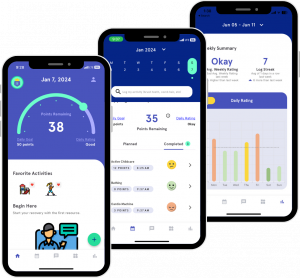
Brainbot has had support from world-renowned medical experts and concussion treatment institutions during the development of its app.
The app presents tools and resources for tracking daily activities and symptoms. It serves up personalized feedback and clinician-vetted strategies, and it lets patients track their progress through updated charts and performance insights.
The app technology keeps patients well-informed during their recovery, and their healthcare team can also use the collected data to offer more personalized care.
“As an Occupational Therapist, I have seen firsthand that many patients with persistent concussion symptoms unnecessarily suffer for years due to a lack of access to the right tools at the right time,” explained Shelley Vaisberg of her motivation to co-found Brainbot. More to the point, she’s also a concussion sufferer. Brainbot provides the “guidance I wish I had when I was struggling through my own eight-month concussion recovery.”
Brainbot is committed to filling that knowledge and guidance gap, and Vainberg added that the accelerator program is a critical step in the company’s efforts to do just that, starting in what she’s called the world’s largest healthcare market, the U.S.
Beyond the boost she’s getting from the accelerator program, Vaisberg points out that Brainbot has had support from world-renowned medical experts and concussion treatment institutions. Advisors include concussion experts Dr. Charles Tator and Dr. Carmela Tartaglia from the University Health Network (where Dunigan gave his talk and to which he has made his organ donation pledge) and its Canadian Concussion Centre.
Currently, Brainbot research partners include the UHN’s TeleNeuroRehab Centre for Acquired Brain Injury at the KITE Research Institute and the University of Toronto, and the company is running a pilot program with the UHN’s Hull-Ellis Concussion and Research Clinic.
In a way, they’re building up that new digital era in healthcare, standing on the foundation of efforts in the past, including right here in Canada.
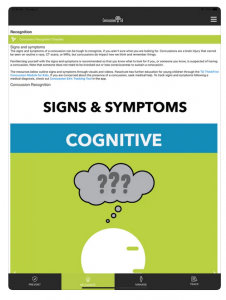
Concussion Ed
Concussion Ed was released a while back with similar goals as other concussion treatment and protocol applications: to provide patients with some interactive resources and tools to prevent, recognize and manage concussions. The app was developed under the guidance of its Expert Advisory Committee and with members from the Canadian Concussion Collaborative. Coordinated with a treating physician’s medical advice, Concussion Ed tracks the signs and symptoms of concussion, following a diagnosis, including symptom duration and severity.
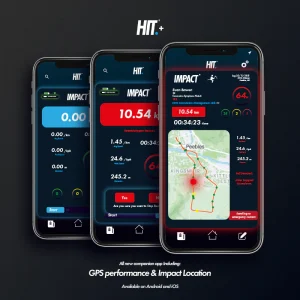
HIT Companion
Another digital sports injury platform, called SportSmart, was developed with support of a charitable company set up by former McLaren F1 racing team owner Ron Dennis. It lets users collect and share information about head injuries, suspected concussions and other sports-related maladies that can be shared health care providers and patient support groups.
The HIT Companion app is a kind of digital concussion symptom checker to help people get instant feedback on injuries they’ve suffered. Developed for competitive cyclists, it tracks performance metrics like time, distance, and speed using GPS, while giving the app user a way to connect with emergency contacts in worst case scenarios. The app also incorporates a return to riding concussion protocol to help make head injury assessments as activities return to a hopefully more normal level.
Something many concussion suffers are still waiting for many years on.
-30-



